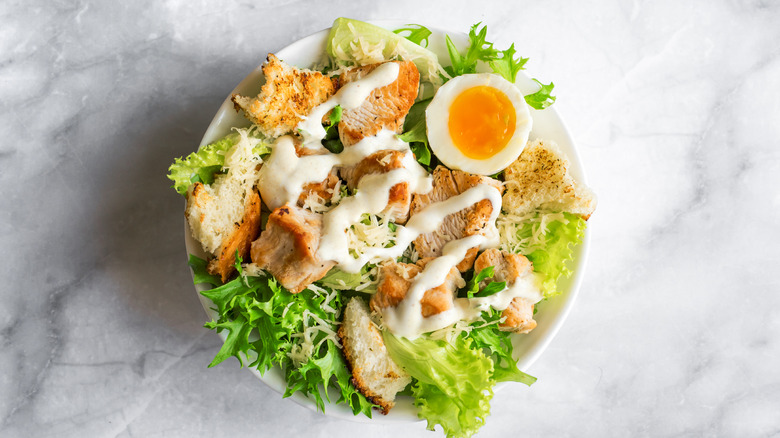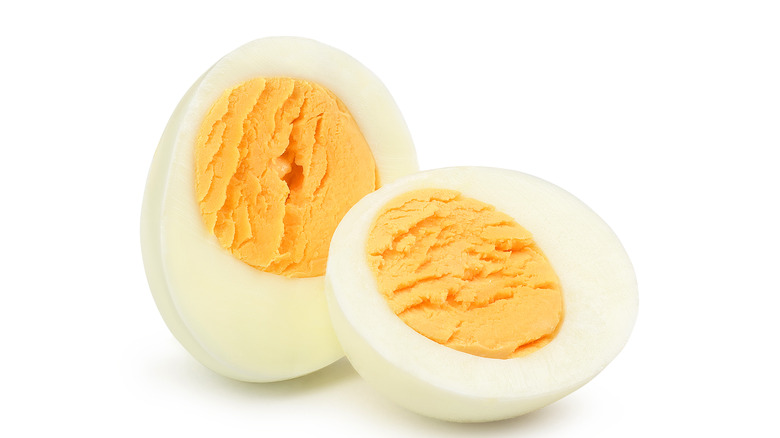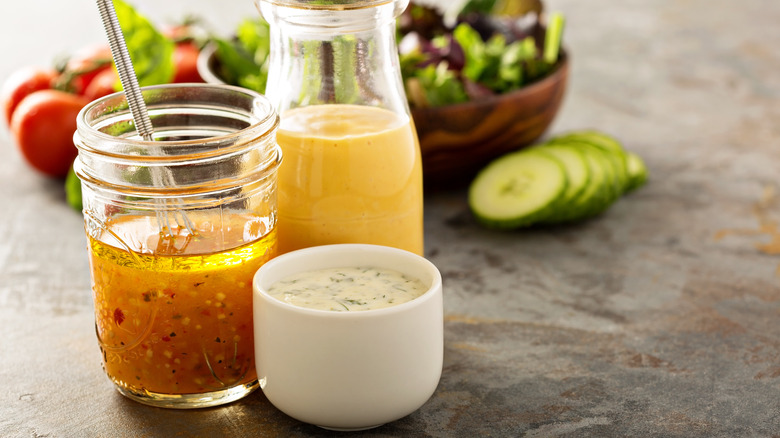Give Salad Dressing A Velvety Texture With Cooked Egg Yolk Crumbles
Creamy salad dressings are delicious, but they may be a forbidden indulgence for some people. A number of recipes, like ranch, use heavy dairy products to thicken the dressing, which may not be agreeable with everyone's digestion or diet plan. Other recipes, like Ceasar salad dressing, rely on raw eggs to emulsify the ingredients, which the Centers for Disease Control and Prevention (CDC) warns can be contaminated with Salmonella. Luckily, there is a way to prepare a creamy salad dressing without relying on mayonnaise, sour cream, or raw egg for body.
Cooked egg yolks deliver the same velvety texture to vinaigrettes without the risk of illness. Depending on the desired consistency, as little as two hard-boiled egg yolks can transform a loose vinaigrette into a thick dressing that perfectly coats salad greens. A homemade dressing will last a week in the fridge, meaning you can make a big batch and enjoy healthier salads with a creamy thickness from the egg yolks all week.
How to make a hard-boiled egg dressing
Add hard-cooked egg yolks to your favorite vinaigrette recipe to thicken it up without altering the flavor, or use the French golden ratio with our vinaigrette, which is three parts oil to one part vinegar or other acid. To make enough dressing to coat a salad for four people generously, you'll need about ½ cup of dressing – 2 tablespoons per serving.
Preparing dressing in a clean, wide-mouth mason jar allows you to shake the ingredients until combined and safely store leftovers in the refrigerator without dirtying more dishes. Alternatively, this can be made in a food processor or blender for smoother results. The crumbled yolks give volume to the dressing and are packed with protein and essential vitamins and minerals like iron, magnesium, and calcium.
Place two hard-cooked egg yolks in the bottom of the jar. Use a fork to mash the yolks until they are pasty, adding a pinch of coarse Kosher salt to help and a teaspoon of Dijon mustard for a sharp, spicy kick. To balance the pungency of the mustard, you may want to add a sweetener like honey or real maple syrup. For ½ cup of dressing, you'll need 2 tablespoons of vinegar or citrus juice and ¼ cup of extra virgin olive oil. Whisk the ingredients until smooth.
Tips for making a hard-boiled egg salad dressing
After you make this vinaigrette once, you can play around with the measurements to adjust the dressing's sweetness or acidity to your palate. If you prefer a more robust dressing, the ratio of oil to vinegar can be one-to-one. How much sweetener you add depends on what type of vinegar you use and the application. Apple cider, balsamic, or rice vinegar will add sweetness to the dressing, whereas white or red wine is sharper. Similarly, using high-quality extra virgin olive oil will add fruitiness. Avocado, grapeseed, or sunflower oil are more neutral-tasting.
When available, play around with different fresh herbs to alter the salad dressing's flavor. Thyme and tarragon pair well with salad Nicoise, while fresh oregano works for Italian and Greek dressings. If using dried herbs, you'll need half the amount.
To prepare a thicker dressing, increase the amount of egg yolks added to the recipe. A thick, hard-boiled egg salad dressing can be used as a dip for crudite or a condiment on sandwiches.
If you can't eat eggs or don't have any in the fridge, try adding mashed avocado, soaked cashews, or coconut milk to make a creamy dressing. These dairy-free options provide another healthier alternative to bottled dressings while delivering the same mouthfeel.



